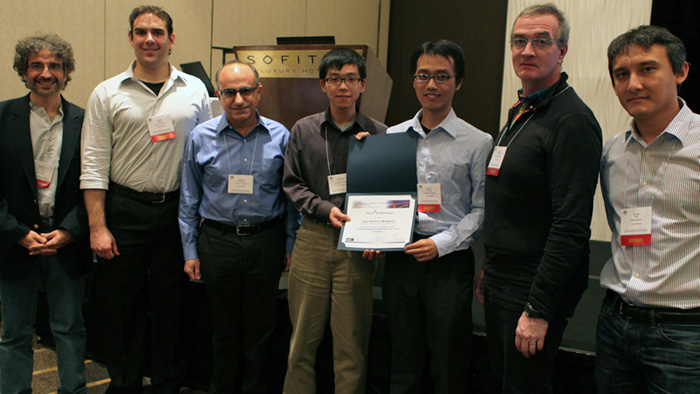
Team Attractor Metagenes receives its award at the DREAM7 Conference. Gustavo Stolovitzky (IBM Research), Adam Margolis (Sage Bionetworks), Dimitris Anastassiou, Tai-Hsien Ou Yang, Wei-Yi Cheng, Stephen Friend (Sage Bionetworks), Erhan Bilal (IBM Research)
The team of Professor Dimitris Anastassiou and graduate students Wei-Yi Cheng and Tai-Hsien Ou Yang has been recognized as the best performer in the Sage Bionetworks – DREAM Breast Cancer Prognosis Challenge. This challenge, one of four organized as part of the seventh Dialogue for Reverse Engineering Assessments and Methods (DREAM7), was designed to assess the ability of participants’ computational models to predict breast cancer survival using patient clinical information and molecular profiling data. As a reward for this accomplishment, the journal Science Translational Medicine has just published a paper from the Anastassiou lab describing their model. It is also the journal’s cover theme for this issue, which includes a second article describing the Challenge.
The Columbia University researchers based their DREAM entry on previous work to identify what they call “attractor metagenes,” sets of strongly co-expressed genes that they have found to be present with very little variation in many cancer types. Moreover, these metagenes appear to be associated with specific attributes of cancer including chromosomal instability, epithelial-mesenchymal transition, and a lymphocyte-specific immune response. As Wei-Yi Cheng comments in Sage Synapse, “We like to think of these three main attractor metagenes as representing three key ‘bioinformatic hallmarks of cancer,’ reflecting the ability of cancer cells to divide uncontrollably and invade surrounding tissues, and the ability of the organism to recruit a particular type of immune response to fight the disease.”